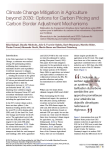Spiegel A., Heidecke C., Fournier Gabela J.G., Stepanyan D., Söder M., Freund F., Gocht A., Banse M., Osterburg B. (2024). Climate change mitigation in agriculture beyond 2030: options for carbon pricing and carbon border adjustment mechanisms. Eurochoices, 01/04/2024, vol. 23, n. 1, p. 19-27.
https://doi.org/10.1111/1746-692X.12425
https://doi.org/10.1111/1746-692X.12425
| Titre : | Climate change mitigation in agriculture beyond 2030: options for carbon pricing and carbon border adjustment mechanisms (2024) |
| Auteurs : | A. Spiegel ; C. Heidecke ; J.G. Fournier Gabela ; D. Stepanyan ; M. Söder ; F. Freund ; A. Gocht ; M. Banse ; B. Osterburg |
| Type de document : | Article |
| Dans : | Eurochoices (vol. 23, n. 1, April 2024) |
| Article en page(s) : | p. 19-27 |
| Langues : | Anglais |
| Langues du résumé : | Anglais ; Français ; Allemand |
| Catégories : |
Catégories principales 07 - ENVIRONNEMENT ; 7.6 - Changement ClimatiqueThésaurus IAMM CHANGEMENT CLIMATIQUE ; AGRICULTURE ; ATTENUATION DES EFFETS DU CHANGEMENT CLIMATIQUE ; CARBONE ; AIDE AGRIENVIRONNEMENTALE ; EUROPE |
| Résumé : | Summary In the EU's climate policy, agriculture is covered as an Effort-Sharing (ESR) sector, i.e. a sector beyond the Emission Trading System and LULUCF. Despite ambitious climate targets for the ESR sectors and an emerging focus on the need for agriculture to make a substantial contribution to climate change mitigation, agriculture has contributed much less to achieving climate targets than other ESR sectors in most EU Member States. A more radical mitigation instrument is required since the potential to increase climate efficiency in EU agriculture is limited. Carbon pricing is considered an effective instrument and is widely adopted in other sectors worldwide. Options on how to reduce related carbon leakage are discussed. Our recommendations for efficient climate change mitigation policy in agriculture are threefold. First, the agricultural sector needs more precise guidance and clear climate targets. Second, although preventing all conflicts between climate change mitigation actions and other policy goals is impossible and inefficient, a policy could minimise adverse effects. Third, since agricultural GHG emissions can only be minimised and compensated by negative emissions in other sectors, well-defined intersectoral coordination is required. |
| Cote : | En ligne |
| URL / DOI : | https://doi.org/10.1111/1746-692X.12425 |







